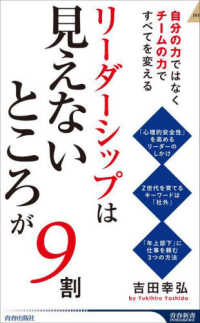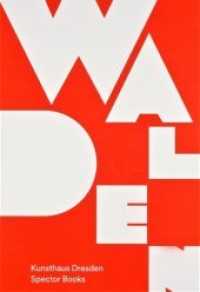基本説明
Contains a DVD with video clips visually demonstrating all the endoscopic procedures step-by-step highlighting common mistakes.
Full Description
Endoscopy is the primary diagnostic method for GI complaints and is replete with an ever expanding array of therapeutic capabilities. Successful Training in Gastrointestinal Endoscopy will provide all gastroenterologists with the exact set of skills required to perform endoscopy at the highest level. GI trainees will find it a crucial primer for learning endoscopy; teachers will find it a guide to understand how best to develop the expertise of their students; and experienced practicing gastroenterologists will find it a useful refresher tool to brush up on their existing endoscopic skills and to familiarise themselves with new procedures, including issues of safety and competence while performing them.
With contributions from internationally recognized leaders in endoscopy education and an endorsement by the World Organisation of Digestive Endoscopy, each chapter will examine the specific skill sets and procedure related tasks which must be mastered when learning a particular technique, including: * Specific descriptions of accessories required * Standard training methods for the procedure * Optimal utilization of novel learning modalities such as simulators * Quality measures and objective parameters for competency * Available tools for assessing competency once training has been completed In addition to the 400 high-quality, outstanding colour photos, the book will come with a DVD containing over 130 annotated teaching videos of both actual procedures and ex-vivo animal model simulations. These videos will illustrate, in a step by step fashion the proper techniques to be followed, highlighting clinical pearls from the experts and the most common mistakes to avoid. Successful Training in Gastrointestinal Endoscopy will be a key purchase for all gastroenterologists, whether in training or experienced, to allow them to develop and perfect their endoscopic skills.
It will be a particularly useful guide for those interested in mastering the latest new techniques and procedures and an essential reference for teachers of endoscopy and students alike. Note: DVD and other supplementary materials are not included as part of eBook file. These materials are available for download upon purchase.
Contents
List of Contributors, vii Foreword, xi Preface, xii Acknowledgements, xiii Part I The Evolution of Basic Principles and Practice. 1 Training in Endoscopy: A Historical Background, 3 Jonathan Cohen & David A. Greenwald 2 How Endoscopy is Learned: Deconstructing Skill Sets, 16 Gerald M. Fried & Kevin A. Waschke 3 Training to Become a High-Quality Endoscopist: Mastering the Nonprocedural Aspects, 22 Sahar Ghassemi & Douglas O. Faigel Part II Training in the Major Endoscopic Procedures. 4 Esophagogastroduodenoscopy (EGD), 31 Lauren B. Gerson & Shai Friedland 5 Colonoscopy, 42 Robert E. Sedlack 6 Endoscopic Ultrasound, 73 Thomas J. Savides & Frank G. Gress 7 ERCP, 85 Joseph Leung & Brian S. Lim 8 Capsule Endoscopy, 97 Felice Schnoll-Sussman & David E. Fleischer 9 Deep Enteroscopy, 109 Patrick I. Okolo & Jonathan M. Buscaglia 10 Choledochoscopy and Pancreatoscopy, 116 Jeffrey H. Lee & Peter Kelsey 11 Principles of Electrosurgery, 125 David L. Carr-Locke & John Day 12 The Use of Fluoroscopy for Gastrointestinal Endoscopy, 135 Douglas G. Adler 13 Pediatric Endoscopy, 143 Michael A. Manfredi & Jenifer R. Lightdale Part III Training in Specific Techniques. 14 Contrast-Enhanced Endoscopy Chromo and Optical Contrast Techniques, 159 Anna M. Buchner, Prateek Sharma, & Michael B. Wallace 15 GI Hemostasis, 170 Brian J. Dunkin, Kai Matthes, & Dennis M. Jensen 16 Luminal Dilation Techniques (Strictures, Achalasia, Anastomotic, IBD), 188 Syed M. Abbas Fehmi & Michael L. Kochman 17 Foreign Body Extraction, 197 Gregory A. Cote, Steven A. Edmundowicz, & Sreenivasa S. Jonnalagadda 18 Endoscopic Mucosal Resection and Endoscopic Submucosal Dissection, 204 Juergen Hochberger, Elena Kruse, Detlev Menke, Edris Wedi, SongSa Dammer, Peter Koehler, & Karl-Friedrich Buerrig 19 Mucosal Ablation Techniques, 237 John A. Dumot, Bruce D. Greenwald, & Virender K. Sharma 20 Complicated Polypectomy, 246 Jerome D. Waye & Yasushi Sano 21 Natural Orifice Translumenal Endoscopic Surgery (NOTES R ), 261 Kai Matthes, Mark A. Gromski, & Robert Hawes 22 Bariatric Endoscopy, 270 Sohail N. Shaikh, Marvin Ryou, & Christopher C. Thompson 23 Repair of Mucosal Defects: A Primer on Endoscopic Closure of Gastrointestinal Perforations, 282 Gottumukkla S. Raju 24 Esophageal, Gastroduodenal and Colorectal Stenting, 288 Peter D. Siersema 25 ERCP Management of Complicated Stone Disease of the Bile Duct and Pancreas, 300 Nithin Karanth, Jonathan Cohen, & Gregory B. Haber 26 ERCP Management of Malignancy: Tissue Sampling, Metal Stent Placement and Ampullectomy, 313 Douglas A. Howell 27 Sphincter of Oddi Manometry, 324 Evan L. Fogel, Stuart Sherman, & Glen A. Lehman 28 Pseudocyst Management, 332 Michael J. Levy & Todd H. Baron 29 Enteral Access Techniques: Percutaneous Endoscopic Gastrostomy and Jejunostomy, 341 James A. DiSario 30 The Endoscopic Management of Immediate Complications of Therapeutic Endoscopy, 351 David A. Greenwald & Martin L. Freeman Part IV Challenges for the Future. 31 Assessing Manpower Needs in Gastroenterology and Digestive Endoscopy: Lessons from the Past and Implications for the Future of Endoscopic Training, 359 Girish Mishra & Alan Barkun 32 Providing Resources and Opportunities for Retraining for Practicing Endoscopists, 367 John L. Petrini 33 Evolving Role of GI Societies and Industry in Training Endoscopists to Perform New Techniques: Supporting the Process and Setting the Standards, 372 John A. Martin & Christopher J. Gostout 34 The Importance of Skills Assessment and Recording Personal Outcomes in the Future of Training, 380 Peter B. Cotton & Roland M. Valori Index, 385







